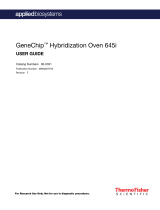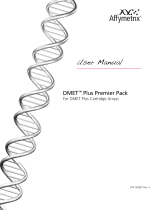Page is loading ...

ARRAYS
INTENDED USE
Human genome sequence variation, which includes both single nucleotide
polymorphisms (SNPs) as well as more complex structural variation in the form
of insertions, duplications and deletions, underlies each individual’s response to
drugs. The DMET™ Plus Array is part of the DMET™ (Drug-Metabolizing
Enzymes and Transporters) Plus Premier Pack that enables comprehensive and
accurate genotyping of specifi c polymorphisms involved in drug metabolism
response.
The polymorphisms represented on this array were chosen by virtue of their
functional signifi cance as documented in the scientifi c literature and have been
publicly reviewed and prioritized by a panel of experts made up from both
the pharmaceutical industry and academia. The product is capable of genotyp-
ing 1,936 high-value drug metabolism and transporter markers in 225 genes.
These markers have been evaluated across a minimum of 1,200 individuals
from multiple populations, including Caucasian, African and Asian.
Refer to the DMET™ Plus User Guide (P/N 702687) for procedures on DNA
target preparation, target hybridization, fl uidics setup, and array scanning for
processing DMET Plus Arrays.
SPECIFICATIONS
Specification Value
Array Format 169
Feature Size 5 µm
Fluidics Station Protocol DMET_Plus_169_v2
Hybridization Volume 95 µL
Library Files DMET_Plus*.*
ORDERING INFORMATION
P/N Product Name Description
901317 DMET Plus Array 48 Arrays
Affymetrix
®
products can be purchased directly from Affymetrix in the
United States, and many European and Asian countries. For all other terri-
tories, please view a list of our distribution partners, which can be located at
www.affymetrix.com/site/contact/index.affx.
INSTRUMENTATION AND SOFTWARE REQUIRED
1. Affymetrix GeneChip
®
Scanner 3000
2. Affymetrix GeneChip
®
Fluidics Station 450
3. Affymetrix GeneChip
®
Command Console (AGCC)
4. Affymetrix GeneChip
®
Hybridization Oven 640 or 645
STORAGE, HANDLING AND STABILITY
The DMET Plus Array consists of a square glass substrate mounted in a plastic
cartridge (Figure 1). The glass contains an array of oligonucleotides that, when
mounted, is on the inner glass surface. A chamber in the plastic housing direct-
ly under the glass acts as a reservoir where hybridization and washing occur.
Although the inner glass surface of the probe array is protected, any con-
tamination or scratches on the outer surface of the glass can compromise the
accuracy of the scan. Avoid touching the surface of the glass with your fi ngers.
Skin oils and other substances, such as lotions or ink, can fl uoresce. If the surface
of the glass is noticeably dirty, it can be carefully cleaned with a non-abrasive
laboratory tissue.
Figure 1. DMET Plus Array
DMET Plus
Arrays should be stored at 2° to 8°C. Refer to the expiration date
on the package label. Do not use arrays or reagents after the expiration date.
PRECAUTIONS
1. DMET PLUS ARRAYS ARE FOR RESEARCH USE ONLY; NOT FOR
DIAGNOSTIC PROCEDURES.
2. Avoid microbial contamination, which may cause erroneous results.
3. WARNING: All biological specimens and materials with which they
come into contact should be handled as if capable of transmitting
infection and disposed of with proper precautions in accordance
with federal, state, and local regulations. This includes adherence to
the OSHA Bloodborne Pathogens Standard (29 CFR 1910.1030) for
blood-derived and other samples governed by this act. Never pipet by
mouth. Avoid specimen contact with skin and mucous membranes.
4. CAUTION: Exercise standard precautions when obtaining, handling, and
disposing of potentially carcinogenic reagents.
5. Exercise care to avoid cross-contamination of samples during all steps of this
procedure, as this may lead to erroneous results.
6. Use powder-free gloves whenever possible to minimize introduction of pow-
der particles into sample or probe array cartridges.
DMET™ Plus Array
DMET Plus Array

For Research Use Only
Not for use in diagnostic procedures
PATENTS
Products may be covered by one or more of the following patents and/or sold
under license from Oxford Gene Technology: U.S. Patent Nos. 5,445,934;
5,700,637; 5,744,305; 5,945,334; 6,054,270; 6,140,044; 6,261,776;
6,291,183; 6,346,413; 6,399,365; 6,420,169; 6,551,817; 6,610,482;
6,733,977; and EP 619 321; 373 203 and other U.S. or foreign patents.
LIMITED LICENSE
Subject to the Affymetrix terms and conditions that govern your use of Affyme-
trix products, Affymetrix grants you a non-exclusive, non-transferable, non-
sublicensable license to use this Affymetrix product only in accordance with the
manual and written instructions provided by Affymetrix. You understand and
agree that except as expressly set forth in the Affymetrix terms and conditions,
that no right or license to any patent or other intellectual property owned or
licensable by Affymetrix is conveyed or implied by this Affymetrix product.
In particular, no right or license is conveyed or implied to use this Affymetrix
product in combination with a product not provided, licensed or specifi cally
recommended by Affymetrix for such use.
TRADEMARKS
Affymetrix
®
,
®
, GeneChip
®
, HuSNP
®
,GenFlex
®
, Flying Objective
™
,
CustomExpress
®
, CustomSeq
®
, NetAffx
™
, The Way Ahead
™
, Tools to Take
You As Far As Your Vision
®
, Powered by Affymetrix
™
, GeneChip-compati-
ble
™
, and Command Console
™
are trademarks of Affymetrix, Inc.
CONTACT INFORMATION
Affymetrix, Inc.
3420 Central Expressway
Santa Clara, CA 95051 USA
E-mail: support@affymetrix.com
Tel: 1-888-362-2447 (1-888-DNA-CHIP)
Fax: 1-408-731-5441
Affymetrix UK Ltd
Voyager, Mercury Park,
Wycombe Lane, Wooburn Green,
High Wycombe HP10 0HH
United Kingdom
E-mail: supporteurope@affymetrix.com
UK and Others Tel: +44 (0) 1628 552550
France Tel: 0800919505
Germany Tel: 01803001334
Fax: +44 (0) 1628 552585
Affymetrix Japan, K. K.
Mita NN Bldg, 16 Floor
4-1-23 Shiba, Minato-ku
Tokyo 108-0014, Japan
E-mail: supportjapan@affymetrix.com
Tel: +81-(0)3-5730-8200
Fax: +81-(0)3-5730-8201
Please visit our web site for international distributor contact information at
www.affymetrix.com.
COPYRIGHT
© 2008 Affymetrix, Inc. All rights reserved.
DMET Plus Array 702718 Rev. 1
10/08
/










